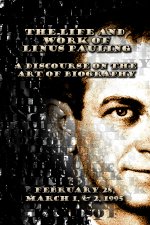Videos: Session 1: Linus C. Pauling Day Lecture
Introduction of Francis Crick.
Ken Van Holde (Biochemistry and Biophysics, Oregon State University)
6:26 - Transcript Available
Van Holde introduces Francis Crick by touching upon the scientist's pathbreaking accomplishments in molecular biology, including the Watson-Crick determination of the double-helical structure of DNA and Crick's important later research on the properties of RNA. Van Holde also mentions Crick's more recent research on the nature of consciousness, including his interest in the possibility of a molecular basis for cognitive processes.
“The Impact of Linus Pauling on Molecular Biology.”
Francis Crick (Salk Institute for Biological Studies)
49:49 - Transcript Available
Crick begins his talk by recounting his personal experiences of first learning about and then meeting Linus Pauling. Crick then expounds upon the profound importance of Pauling's legacy as it relates to the study of molecular biology. In so doing, Crick discusses Pauling's research on the molecular structure of proteins including his discovery of the alpha-helix, his studies on protein denaturation and his participation in "the race" for the structure of DNA. He likewise touches upon Pauling's interest in the nature of antibodies and antigens, his conceptualization of sickle cell anemia as a molecular disease and his development, with Emile Zuckerkandl, of "the molecular clock." Having detailed this impressive body of work, Crick concludes that Pauling was, indeed, "one of the founders of molecular biology."
Watch Other Videos
Session 1: Linus C. Pauling Day Lecture
- Ken Van Holde - Introduction of Francis Crick.
- Francis Crick - “The Impact of Linus Pauling on Molecular Biology.”
Session 2: The Biographer's Picture of Linus Pauling
- Fred Horne - Session Introduction: “The Biographer's Picture of Linus Pauling.”
- Tom Hager - “The Bootlegger's Son: Or the Stochastic Method in Biography.”
- Ted Goertzel - “Analyzing Pauling's Personality: A Three Generational, Three Decade Project.”
- Robert Paradowski - “The Biographical Quest: Some Personal Reflections of a Pauling Biographer on the Art and Science of Scientific Biography.”
- Lily Kay - “The Biographer's Picture of Linus Pauling.”
- Derek Davenport - “Boswellizing Pauling.”
Session 3: The Personal View of Linus Pauling and His Work
- Crellin Pauling - Session Introduction: “The Personal View of Linus Pauling and His Work.”
- Matthew Meselson - “Linus Pauling as an Educator.”
- Ken Hedberg - “The Human Side of Linus Pauling.”
- William Lipscomb - “Reflections.”
- David Shoemaker - “My Memories and Impressions of Linus Pauling.”
- Frank Catchpool - “Personal Reminiscences about Linus Pauling.”
Session 4: Historians and Contemporary Scientific Biography
- S.S. Schweber - “Writing the Biography of a Living Scientist: Hans Bethe.”
- Frederic L. Holmes - “Historians and Contemporary Scientific Biography.”
- Judith Goodstein - “Tales In and Out of 'Millikan's School.'”
- Robin Rider - “Manuscript Collections in the Biographical Enterprise.”
- John L. Heilbron - “Remarks on the Writing of Biography.”


